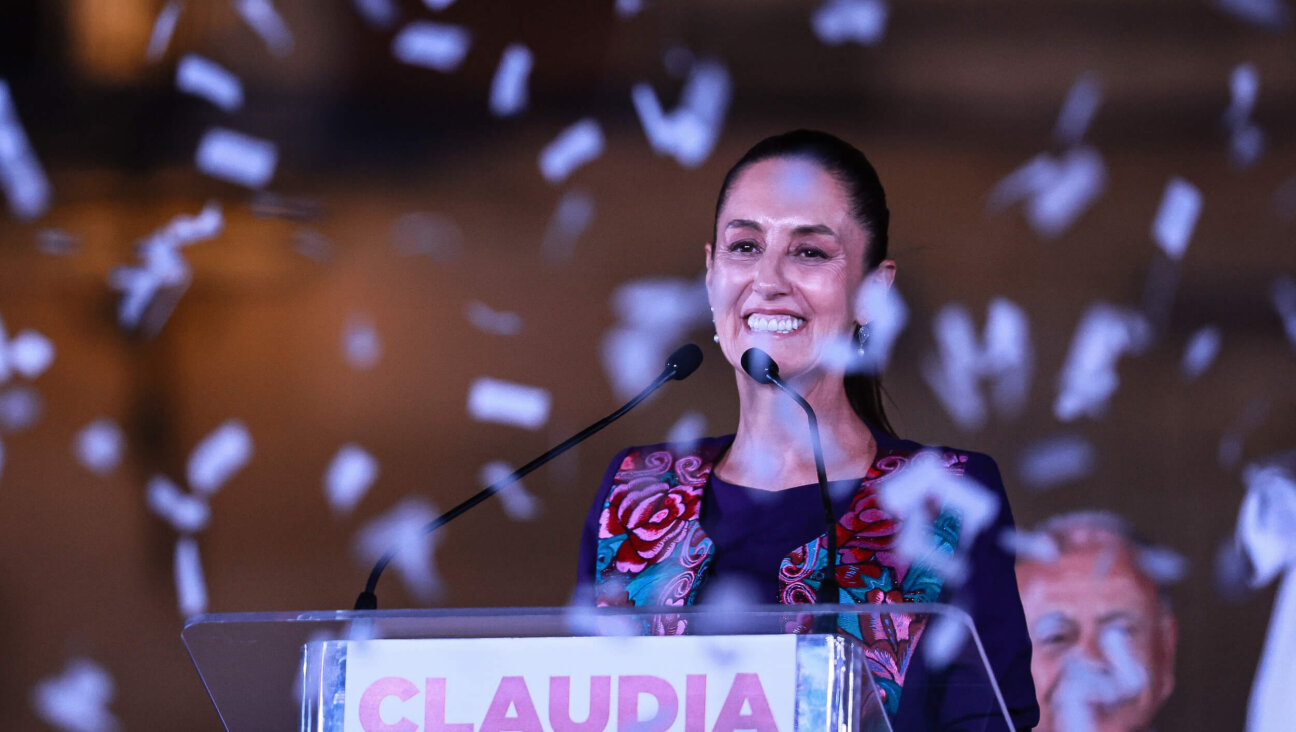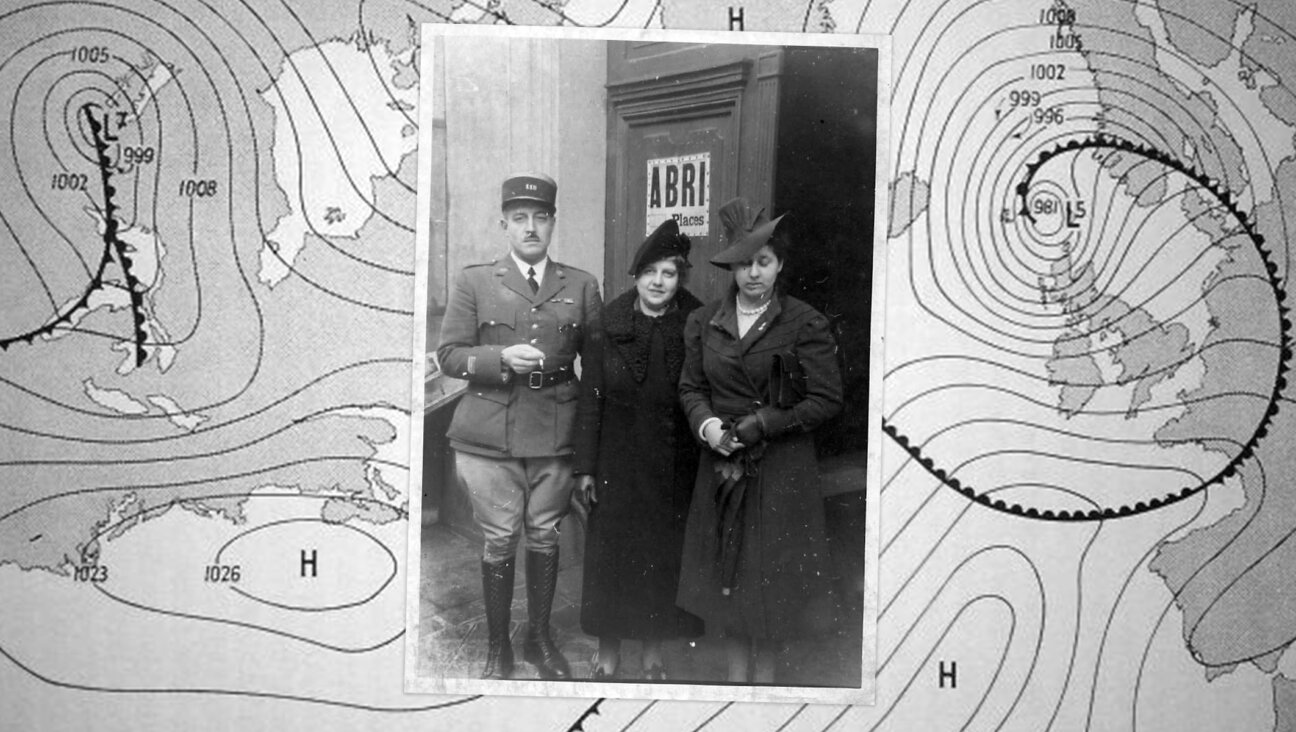My relative running for Congress is part of a movement that endangers Jews. Should my family speak out?
Just how far should we go for family loyalty, wonders a relative of a Trump loyalist

(L-R) Former U.S. President Donald Trump listens as Max Miller, Republican candidate for Ohio’s 7th congressional district, speaks during a rally hosted by the former president at the Delaware County Fairgrounds on April 23, 2022 in Delaware, Ohio. Photo by Drew Angerer/Getty Images
Max Miller belongs to a political movement that’s endangering America and endangering Jews. He is also my first cousin.
A former Trump aide and self-proclaimed part of the “America First team,” Max Miller is the Republican nominee for Congress in the newly-formed, gerrymandered Ohio 7th Congressional District.
Last month, Max spoke at a Trump rally in Ohio right before Marjorie Taylor Greene. During the rally, some in the crowd gave Trump a straight armed, one-finger salute. I and many others were horrified at the resemblance to a Nazi Sieg Heil. Apparently, it’s a QAnon gesture. But under these circumstances, no board member of the Holocaust Memorial Council, like my cousin, should have tweeted out the next day that the rally was a “fantastic night.”
What is our family to do? And really, what are any of us to do?
This is not the first time my family has been in this sort of situation. Josh Mandel married into our family in 2008 (but has since divorced), and his political rise caused divisions in our family. Despite his right-wing and extremist positions, even some Democratic family members supported his campaign in 2012. Most likely did not.
Now, once again, there are divisions in our family over politics. My large extended family has long been a champion of Jewish values, but as far as I know, only a few of us have spoken out against Max’s campaign. This is the case even though most in the family reject Trumpism and work to “repair the world” every day.
I have heard different reasons for this silence. One commonly cited reason has been “family loyalty.” I can understand why specific individuals have not been able to speak out, and it’s frightening to take a public stand. But to those who cite some variation of “family loyalty,” what about loyalty to the values our family has stood for for generations? And what about loyalty to the broader Jewish family?
The silence feels like a choice that “leads deeper into the darkness,” as my cousin Austin Ratner so eloquently wrote in the Forward a decade ago, of the Democrats in our family who supported Mandel’s first Senate campaign.
I fear some of my family members do not appreciate just how real the dangers of the present moment are. Indeed, this isn’t partisan. What I’m seeing with the rise of Trumpism seems to be exactly what my family and the broader Jewish community warned me about growing up.
Before making the decision to immigrate to America in the early 20th century, our family lived in fear of pogroms and virulent antisemitism in the shtetls of Eastern Europe. In the United States, like millions of other Jews, they finally found a real home where they wouldn’t live in fear of expulsion, persecution or extermination.
The America that made all of this possible — where Jews were just as American as everybody else, where it didn’t matter what our last name was or how we prayed — is under attack. And it’s under attack, in part, from the movement to which my cousin belongs.
Not every Trump supporter is antisemitic, and there are many factors contributing to antisemitism in the U.S. But Trumpism, with its xenophobia, conspiratorial worldview, and courting of white supremacists, is helping to transform this country from one where Jews are relatively safe to one where Jews are more in danger.
It feels like some of my relatives are waiting to hear ominous music playing on blast to warn them of impending danger. But this is not how history works.
Last summer, I met a man originally from Hungary whose mother spent time in Auschwitz. Before the Jews were deported, his mom expressed concern to a relative, who told her not to worry, that Hungary was “a nation of laws.” Almost the entire family was killed in the camps.
Throughout it all, I’ve thought a lot about my Jewish ancestors. My great-grandfather (who is also Max’s great-grandfather) was smuggled out of Poland dressed as a cattle herder, and eventually made it to the U.S. and achieved more than he ever could have dreamed. What would he think about the Hungarian fascist Victor Orban being warmly embraced in America by the political movement that includes his descendant?
His daughter, our bubbe, ran for Congress in Ohio as a Republican and was one of the most beloved women in Cleveland when she died in 1996. What would she think about her grandson running for Congress as an ally of a man who once said that he wished American Generals behaved more like “German Generals”?
I don’t know for certain. They valued our family more than almost anything. But I think ultimately, they wouldn’t be able to stay silent.
They would desperately want to support their family members. But as Jews, they would do all they could to fight for the country that gave them refuge. They would see the very real danger that awaited us if we didn’t follow the lessons of history. And I think they would also believe that by fighting for our shared Jewish values, they would, in fact, be fighting for their family.
I worry that some relatives I love will take personal offense at this article. I worry that I might not feel welcome by some at our family Seder, a convening that has lasted generations and often counts more than 100 in attendance. My uncle Abe, Max’s father, is my favorite uncle. And until I spoke out against his son, I believe he would have done anything for me.
As the scholar Timothy Snyder wrote in “On Fascism”: “It is easy to follow along. It can feel strange to do or say something different. But without that unease, there is no freedom.” I understand why members of our family couldn’t or wouldn’t speak out in this particular instance. But I hope they understand why I had to.
To contact the author, email [email protected].
A message from our Publisher & CEO Rachel Fishman Feddersen

I hope you appreciated this article. Before you go, I’d like to ask you to please support the Forward’s award-winning, nonprofit journalism so that we can be prepared for whatever news 2025 brings.
At a time when other newsrooms are closing or cutting back, the Forward has removed its paywall and invested additional resources to report on the ground from Israel and around the U.S. on the impact of the war, rising antisemitism and polarized discourse.
Readers like you make it all possible. Support our work by becoming a Forward Member and connect with our journalism and your community.
— Rachel Fishman Feddersen, Publisher and CEO






























